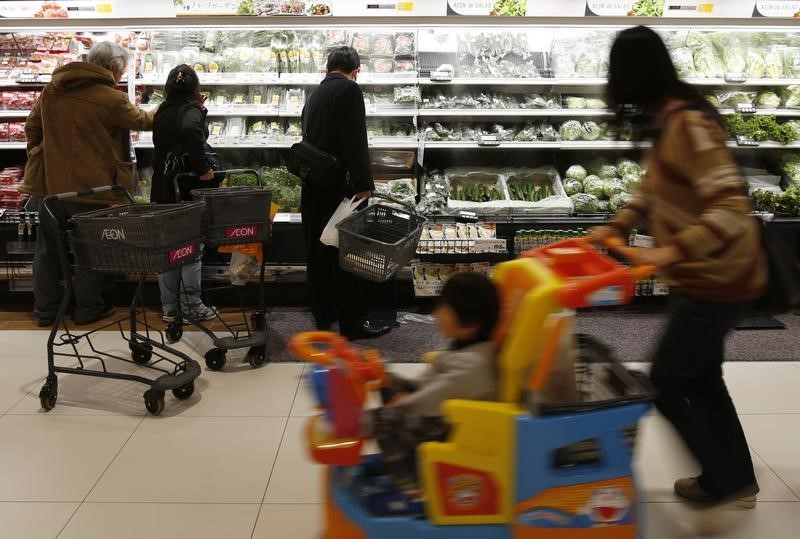By Leika Kihara and Stanley White
TOKYO (Reuters) - Japanese business confidence was subdued in the second quarter and consumer prices fell in May at the fastest pace in three years, heightening pressure on the central bank to roll out yet more stimulus to ease the pain from a strong yen.
The government is also seen increasing fiscal spending as weak overseas demand hurts exports, though critics warn that throwing more money into the economy won't fix chronic woes plaguing Japan like low productivity and a rapidly shrinking labor force.
The slew of weak data came as global policymakers scramble to deal with market turbulence caused by Britain's vote last week to leave the European Union, which threatens premier Shinzo Abe's efforts to pull Japan out of decades of stagnation.
"Monetary and fiscal policies only buy time and what's important is to pursue structural reform," said Katsuya Okada, head of the main opposition Democratic Party. "Three and a half years were wasted as Abe delayed reforms," he told reporters.
The Bank of Japan's closely-watched quarterly tankan survey on Friday showed the headline index for big manufacturers' sentiment stood at plus 6, unchanged from three months ago.
The survey's big non-manufacturers' sentiment index worsened to plus 19 from plus 22, while separate data showed household spending fell for the third straight month in May and core consumer prices suffered their biggest annual drop since 2013.
All of this kept the BOJ under pressure to expand stimulus as early as its rate review on July 28-29.
The central bank added negative interest rates in February to its stimulus program launched in 2013, under which it prints 80 trillion yen ($780 billion) a year to buy government bonds, but inflation has failed to make headway to its target.
"Worsening sentiment for non-manufacturers represents weak demand. This gives the government an incentive to increase stimulus spending," said Daiju Aoki, an economist at UBS Securities.
Japan's economy expanded at the fastest pace in a year in the first quarter but analysts say growth will not pick up much for the rest of this year as slow wage gains crimp consumption. External headwinds, such as weak emerging market demand and the yen's gains, also threaten exporters' income.
BREXIT NOT FACTORED IN
A vast majority of firms replied before the Brexit vote jolted markets, suggesting that business sentiment may have deteriorated more than the tankan survey shows.
Manufacturing activity shrank in June for the fourth consecutive month, a separate survey showed, a sign Brexit and the ensuing market turmoil were taking a toll.
The yen's recent gains are also expected to weigh on exporters' profits and may discourage them from executing their spending plans, some analysts say.
Big manufacturers expect the dollar to average 111.41 yen in the current fiscal year, much higher than recent levels around 102 yen, a sign they have yet to take into account the pressure on profits from the yen's recent spike, the tankan showed.
The strong yen is pushing down imported goods prices, which may help consumption but heightens challenges for the BOJ to accelerate inflation to its 2 percent target.
The core consumer price index, which strips away the effect of volatile fresh food costs, fell 0.4 percent in May from a year earlier, marking the biggest drop since the BOJ deployed its huge asset-buying program in 2013.
The BOJ's own consumer price index, which excludes both fresh food and energy costs, saw inflation hit 0.8 percent in May, marking the slowest pace of rise since June last year and heightening calls for the central bank to expand stimulus soon.
"If the government announces the size of stimulus spending shortly after the upper house election next week, the BOJ could ease policy at the end of the month," UBS's Aoki said.
